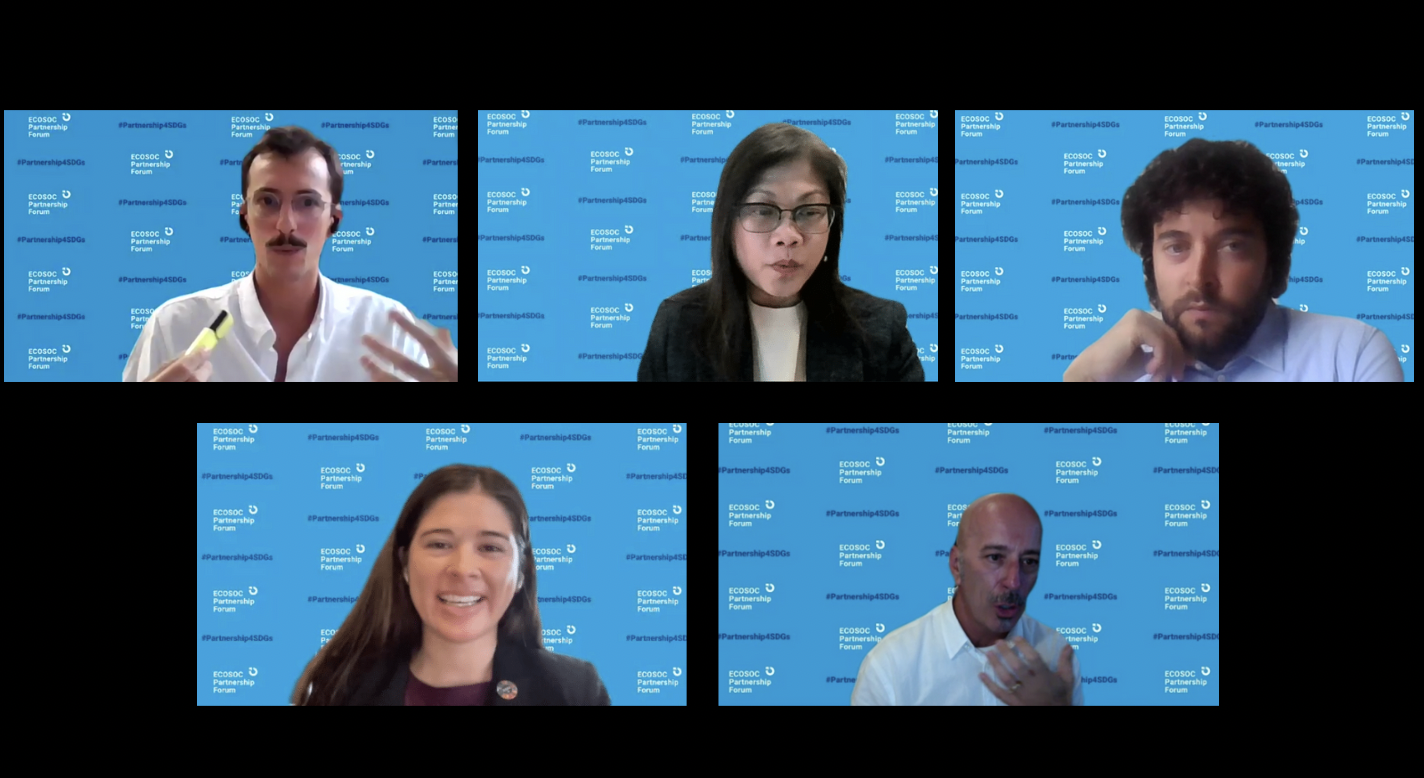
With less than ten years ahead to meet the global goals set on the 2030 Agenda for Sustainable Development, the need for renewed and transformative partnerships to thrive sustainable development is more central than ever. The session, co-organized by UN-Habitat, UNDP and the Local2030 Coalition in the framework of the 2022 ECOSOC Partnership Forum explored how the different settings of multi-stakeholder partnerships and multi-level governance are helping to advance sustainability at the local level and in line with the SDGs. Panelists had a fruitful discussion supported with practical experiences and meaningful reflections.
The Moderator, Martino Miraglia, reflected on the importance of collaboration across multiple actors, sectors, levels, and spheres of government and emphasized that the SDGs are helping to revitalize existing partnerships by providing a new, modern look at how different stakeholders can work together based on common objectives.
The discussion was framed in line with SDG17 on “partnerships for the goals” and heard from different proposals on how to effectively engage the whole spectrum of actors that are advancing sustainable development. Focusing primarily on how to mainstream local action for the implementation of the SDGs, and regard local partners as experts.
Nicolas Gharbi, representative of the Madrid City Council, emphasized that the SDGs and the New Urban Agenda (NUA) serve as the common language that gathers different stakeholders towards the city strategy that ultimately contributes to SDG implementation. According to Mr. Gharbi, Madrid’s partnership strategy is based on a multi-stakeholder and the multi-level perspective. This ensures the creation of synergies and brings consistency and transparency to the actions being taken by the city and different levels of government and a variety of territorial actors. He also emphasized the need to transit from the localization to the territorialization of the SDGs by fostering community ownership.
Felipe Braga Farhat, from Paraná State, gave important insights on the bridging role of subnational government between municipalities and the central government. Paraná is closely supporting the municipalities to develop their strategies and implement initiatives in order to help municipal leaders achieve the 2030 Agenda, based on the specific needs of their territories. Along with that, the State developed tools, indicators and a report mechanism to guide the actions being taken by the municipalities. Moreover, the Paraná is actively creating a series of partnership opportunities that involves different stakeholders from the community and the private sector, to ensure that no one is left behind. Finally, Mr. Braga Farhat shared the example of the SDG Art initiative as a successful effort on how to bring different parts of the society around the goals through culture.
Laura Kam, from Hawaii Green Growth, a Hawaiian network-based organization, brought forward the value of representative partnerships that reflect the voices of society. Ms. Kam introduced the Aloha+ Challenge program, the statewide sustainability framework for 2030 that also guides the local implementation of the SDGs in Hawaii. She stressed the relevance of measuring the impact of SDG-related initiatives involving stakeholders through the Aloha+ Dashboard. Participatory processes such as the hyper-localized dashboards were also highlighted for including the opinions of the communities. This collaborative and inclusive process was reflected in the Hawaiian Voluntary Local Review.
Minerva Novero, from UNDP on behalf of the Local2030 Coalition, advocated the role of the United Nations as enabler to achieve the SDGs in the face of contemporary challenges. Focusing particularly on the efforts made by local stakeholders to address global challenges and for being an integral part of the solution. Ms. Novero described the Local2030 as a revolutionary institutional mechanism for being a truly global multi-stakeholder platform, which is fundamental to advancing the SDGs and the NUA.
2022 is a critical year for local authorities and SDG localization within the UN system. The Moderator highlighted the roadmap of coming events that will set the international community agenda: High Level Meeting on the New Urban Agenda (28th April, 2022); World Urban Forum 11 (26th – 30th June, 2022; High-Level Political Forum (5th – 15thJuly, 2022).
Key recommendations for meaningful and effective multi-stakeholder partnerships:

Comments